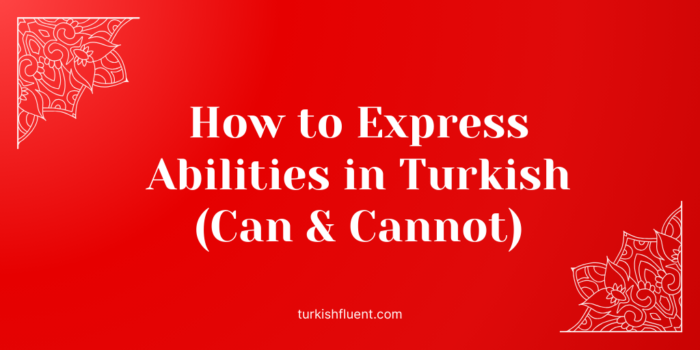When learning Turkish, understanding how to express ability — saying “can” and “cannot” — is essential. In Turkish, expressing these concepts involves specific suffixes and conjugation. Let’s dive into each in this article.
How to Express Ability in Turkish – Can / Could / Able to
In Turkish, expressing the ability or possibility (can, could, or to be able) is expressed by attaching the suffix “-ebil-“ or “-abil-“ to the verb stem, followed by the verb’s conjugation according to the subject. This suffix changes based on vowel harmony: if the verb stem has a front vowel (e, i, ö, ü), use “-ebil-“; if it has a back vowel (a, ı, o, u), use “-abil-“:
[Verb] + (y)ebil/(y)abil + [Tense Suffix] + [Personal Suffix]
| Last Vowel of Verb Root | Suffix |
|---|---|
| a / ı / o / u | -[y]abil- |
| e / i / ö / ü | -[y]ebil- |
This suffix can be used to talk about possibilities, requests, permission, suggestions, and abilities.
Abilities (Yetenek):
- Türkler 40 derece sıcakta çay içebilir. (Turks can drink tea in 40-degree heat.)
- Sibel çok güzel piyano çalabilir. (Sibel can play the piano very beautifully.)
Suggestions (Öneriler):
- Bence yurtdışında okumayı düşünebilirsin. (I think you can consider studying abroad.)
- İstanbul’a gelmişken hamama gidebilirsin. (While you’re in Istanbul, you can go to a Turkish bath.)
Permission (İzin Alma):
- Anne, bu akşam arkadaşımda kalabilir miyim? (Mom, can I stay at my friend’s house tonight?)
- Öğretmenim, lavaboya gidebilir miyim? (Teacher, may I go to the restroom?)
İhtimal (Possibility):
- Hava çok bulutlu. Yağmur yağabilir. (The weather is very cloudy. It might rain.)
- Çok trafik var. Belki geç kalabilirim. (There is a lot of traffic. I might be late.)
You can use the “can” suffix with any tense, just don’t forget the suffix “-ebil-” or “-abil-” comes before the conjugation of the verb (in second order after the verb stem).
How to Express Inabilities in Turkish – Can’t / Couldn’t / May not / Might not / May not be able to
There are different ways of expressing inabilities in Turkish, translating to can’t, couldn’t, may not, might not or may not be able to. Let’s learn how to use each of them and understand their differences.
Negative I (Can’t / Couldn’t )
Expressing what we cannot do is just as important as talking about what we can do. But here’s where it gets interesting: while we use the suffix -ebil/-abil to indicate our ability, the negation of this ability doesn’t follow the same simple pattern. Instead of using -ebil/-abil, we negate the verb itself.
Verb Root + (y)A + (-me / -ma) + Tense Suffix + Personal Pronoun Suffix
| Full Turkish Verb | Verb Root | (y)A | (-me / -ma) | Tense Suffix | Personal Pronoun Suffix | Full Negative Form |
| Görmek (to see) | Gör | e | me | di | m | Göremedim (I couldn’t see) |
| Yemek (to eat) | Ye | ye | me | ecek | sin | Yiyemeyeceksin (You won’t be able to eat) |
| Yapmak (to do) | Yap | a | ma | miyordu | – | Yapamıyordu (He/She couldn’t do) |
Örnekler (Examples):
- Çantam çok ağır. Tek başıma taşıyamıyorum.(My bag is very heavy. I can’t carry it by myself.)
- Ateşim çıkınca sınava giremedim. (When I had a fever, I couldn’t take the exam.)
- Merve çok güzel piyano çalıyor ama hiç dans edemiyor. (Merve plays the piano very well, but she can’t dance at all.)
- Ayrılalı 3 ay oldu ama onu hala unutamadım. (It’s been 3 months since we broke up, but I still can’t forget him/her.)
- Aslında daha erken evlenecektik ama Covid’den dolayı evlenemedik. (We were actually supposed to get married earlier, but because of Covid, we couldn’t get married.)
- Onu saatlerce aradık ama maalesef ulaşamadık. (We called him/her for hours, but unfortunately, we couldn’t reach him/her.)
- O asla biriyle yaşayamaz. Özgürlüğüne çok düşkün. (He/She can never live with someone. He/She is very attached to his/her freedom)
Negative II (May not / Might not)
This negative form is used in predictions & possibilities. There is no implication of ability or inability—the person can do it, but they might choose not to or for some unknown reason, it may not happen.
verb + ma + (y)abil + present simple tense + personal pronoun suffix
- O gelmeyebilir. (He/she may not come.) → Maybe they don’t want to, or we just don’t know.
- O filmi sevmeyebilirsin, çok ağır bir drama. (You may not like that movie; it’s a really intense drama.)
- Beni bir daha aramayabilir. Sanırım ilgisini kaybetti. (He/she may not call me again. I think they lost interest.)
Negative III (May not be able to)
In this version, there is an element of inability, an obstacle. Even the person wants to do it, there is an something stopping them from it.
verb + e/a + ma + (y)abil + present simple tense + personal pronoun suffix
- O gelemeyebilir. (He/she may not be able to come.) → He/she wants to come, but something (traffic, illness, etc.) might prevent them.
- Yarın sınava giremeyebilirim. (I may not be able to take the exam tomorrow.) → This correctly implies an obstacle (maybe I’m sick or unprepared).
- Bugün hava çok sıcak, dışarıda fazla yürüyemeyebiliriz. (It’s very hot today; we may not be able to walk outside for long.)
- Biletler çok pahalı, konsere gidemeyebiliriz. (The tickets are too expensive; we may not be able to go to the concert.)
| Structure | Meaning | Focus | Example Sentence |
| -meyebilir | May not / Might not | Possibility (No ability issue) | O gitmeyebilir. (He/she may not go.) |
| -emeyebilir | May not be able to | Inability / External obstacle | O gidemeyebilir. (He/she may not be able to go.) |
